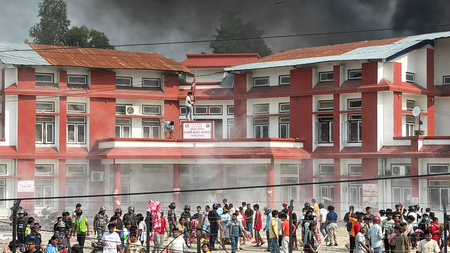
Patna: Security has been strengthened along the Indo-Nepal border after violent protests and political unrest gripped Nepal’s capital, Kathmandu.
A large deployment of SSB jawans has been stationed across the border, with joint patrols by district police and security forces on vulnerable stretches. Movement across the international boundary has been restricted, and several checkposts on the Nepalese side were set ablaze by protesters, leaving thousands stranded on either side.
Araria Superintendent of Police Anjani Kumar has ordered all border police stations and outposts to remain on high alert, closely monitor developments inside Nepal, and report immediately to district headquarters.
Nepal’s Political Crisis Deepens
Nepal is facing widespread unrest sparked by public anger over a social media ban, corruption, and nepotism. What began as student-led Gen Z protests against the government’s ban on social media quickly expanded into a larger movement.
The situation escalated dramatically after Prime Minister K.P. Sharma Oli resigned, prompting protesters to set fire to the Supreme Court, Parliament, and other government buildings. With civilian authorities overwhelmed, the Nepal Army imposed a nationwide curfew from Wednesday evening until Thursday morning, assuming responsibility for maintaining law and order.
Strategic Significance for India
Once considered one of South Asia’s most politically stable nations, Nepal is now facing an unprecedented crisis. The instability comes against the backdrop of regional upheavals, with uprisings in Sri Lanka and Bangladesh in recent years already affecting India.
Nepal holds strategic importance for India, not only due to cultural and historical ties but also as a key trading partner. In FY 2024–25, bilateral trade stood at $8.5 billion, with India exporting goods worth $7.33 billion and Nepal exporting around $1.2 billion — nearly 16% of Nepal’s GDP.
India exports petroleum, vehicles, machinery, medicines, food products, and textiles, while Nepal sends agricultural produce, handicrafts, leather, and industrial goods. Several cross-border infrastructure projects — including road, rail, and air link upgrades — are underway to enhance trade and connectivity.
India’s Response
Despite the turmoil, India is seeking to preserve stability in bilateral ties by working to ease trade barriers, attract investment, and maintain supply chains. New Delhi has also stepped up diplomatic outreach, signaling its commitment to supporting Nepal during this crisis.
Analysts believe that once stability is restored, India-Nepal economic cooperation could deepen further, boosting growth and strengthening regional stability in South Asia.
With inputs from IANS